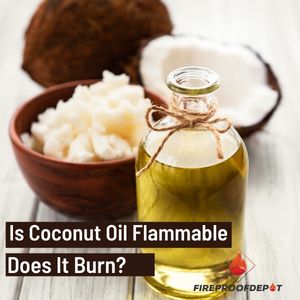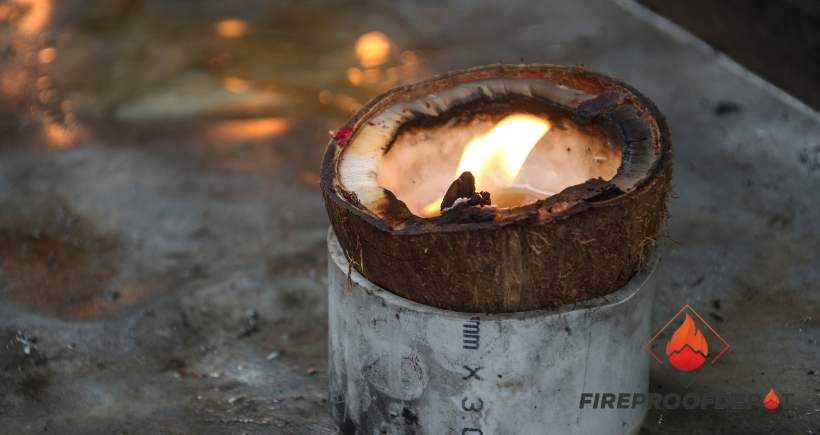
Coconut oil has been rising in popularity, and many people are using it in their cooking and skincare. But there’s one property that not many people know about, and that’s its flammability.
While some oils are entirely safe to use around the stove and the frying pan, coconut oil can actually pose a threat when it comes into contact with flames and sparks from your kitchen range or the hot stove!
Coconut oil is a highly flammable liquid. It has a specific flashpoint and smoke point temperature. If it is heated to a certain temperature and gets in touch with any flame source, it ignites quickly.
In this fireproof depot guide you’ll learn the following:
- Common uses of coconut oil
- Flammable or not
- Flash and melting point
- Is coconut oil toxic
- FAQs and more..
Related: Is Castor Oil Flammable/Combustible? Facts, Uses & Flashpoint
What is coconut oil?
Coconut oil is a cooking oil made from the meat of the Coconut. It has a high smoke point and is therefore helpful for sautéing, frying, baking, and even making soap.
If you use this in place of butter or other vegetable oils like olive oil, it will add a rich flavor to your food. This oil also has anti-microbial properties suitable for cooking foods such as meats.
The main reason people are using coconut oil these days is its many health benefits.
There are two types of it: unrefined and refined. The difference between the two types is how much processing the oil goes through before it becomes edible or usable.
- Unrefined coconut oil does not go through any additional processing to become edible or usable for consumption.
- Still, refined coconut oil does because the process strips out all of the natural goodness from the oil, making it an unusable product at its current state.
What are some common uses and benefits of coconut oil?
Coconut oil is the most versatile cooking oil and a dietary staple in many cultures. The nutrient-rich, saturated fat-free oil is high in antioxidants, vitamins, minerals, and fatty acids.
- Health benefits of coconut oil include being a source of medium-chain triglycerides (MCTs), which can be used as an energy source for the body, reducing cholesterol levels, and improving digestion.
- It is a good source of Lauric acid, a type of saturated fat that is beneficial for your skin and hair.
- It is a good source of vitamin E, which helps protect the skin from sun damage and reduces the risk of wrinkles and age spots.
- Coconut oil has anti-inflammatory properties, which can help reduce pain and inflammation caused by conditions such as arthritis or Crohn’s disease.
Is Coconut oil flammable?
Yes, it is highly flammable.
This is flammable because it contains a high level of lauric acid. Lauric acid is a type of saturated fat found in it and other tropical oils.
When heat is applied to coconut oil, the lauric acid starts to break down and release volatile compounds (VOCs). VOCs are harmful chemicals that can cause fires in the presence of oxygen.
These volatile compounds are what makes the oil flammable. If you are using the oil for cooking or for any other purpose where it could come into contact with flames, be sure to keep it away from open flames, or else it could start burning.
What is the flashpoint of coconut oil?
The flashpoint of a substance is essentially the lowest temperature. It is possible to ignite a liquid without an explosion occurring. That may not sound very clear, but it’s pretty simple.
What flashpoint does for us in terms of coconut oil is determine whether or not it can catch fire when exposed to heat or flame.
It has a flashpoint of 563 degrees Fahrenheit (295 Celsius) in liquid form, so to burn, it needs to be heated above that temperature.
What is the smoke temperature of coconut oil?
The smoke point of cooking oil is essentially a measure of how hot you can get an oil before it begins to break down and release carcinogenic chemicals when searing, grilling, or frying foods.
That’s why knowing what’s going on inside your cooking vessel is so essential. At room temperature (about 72 degrees Fahrenheit), coconut oil has a smoke point of 385 degrees Fahrenheit or 196 Celsius, making it reasonably easy to use.
The ignition of an oil greatly depends on this temperature. However, you’ll have to look at other factors besides temperature that goes into determining whether or not a substance will burn (i.e., is flammable).
Can I start a fire with coconut oil?
It is true that coconut oil can be used to start a fire. When it is heated and melted, it becomes flammable.

To start a fire with coconut oil, you will need to heat the oil until it is liquid. Add wood chips or chunks once the oil is liquid and wait until the fire starts burning.
If applied to a lit match, it will burn as any other oil would. Even if you don’t have matches around, coconut oil can still be ignited by an open flame like a candle or even a lighter.
It just takes a little more patience because you need to ignite some of its combustible parts first.
What are the fire fighting measures in case of fire due to coconut oil?
Coconut oil is slow to ignite and burns without flames. Still, it produces smoke that can trigger asthma attacks in sensitive people.
The fire should be put out with water or a carbon dioxide extinguisher. Otherwise, it could have carbon monoxide, which is deadly.
When fighting a fire due to coconut oil, stay back at least two feet from flames or smoke because of its flammability. Any resulting injuries should be treated by a doctor immediately.
Related: Does Olive Oil Catch On Fire?
Is coconut oil toxic?
Some people think that coconut oil is toxic because it contains saturated fat. In actuality, thisl contains very little saturated fat.
What it does contain has been shown to raise HDL levels in your blood while lowering LDL (the bad) cholesterol. It also helps burn calories and increases metabolism when taken internally.
Oh yeah: it also tastes delicious! There are numerous health benefits to consuming coconut oil—but is it toxic?
No way. Just avoid heating it to extreme temperatures for cooking purposes.
Frequently Asked Questions
1. Is coconut oil safe for high heat?
In a word, no. Coconut oil’s high saturated fat content makes it ideal for low-heat applications, like baking or making desserts. But because it’s so highly saturated, it will break down into unhealthy trans fats at high temperature.
2. Is coconut oil safe to use with oxygen?
Some materials combust at a low temperature and may cause fires when used with oxygen in an oxygen system. These include liquids, gasses, and vapors flammable under normal atmospheric conditions. Before using any oil, always consult your oxygen supplier or equipment manufacturer to ensure it is safe to use in your oxygen system.
3. Does heat burn coconut oil?
Yes, heat will burn coconut oil. Coconut oil is vegetable oil, and like other oils, it will start to smoke and produce a foul odor when it is burned.
Final Words
Coconut oil is a healthy cooking ingredient that can be used in various ways. But it would be best if you always used it with caution and under the supervision of a trained professional. It can be flammable if exposed to heat, so make sure to keep your home temperature low and never leave it unattended when heating.
sources
- Cooking oil – Wikipedia.” Cooking oil – Wikipedia. Accessed 30 Jan. 2022.
- “Template:Smoke point of cooking oils – Wikipedia.” Template:Smoke point of cooking oils – Wikipedia. Accessed 30 Jan. 2022.
- “SAFETY DATA SHEET.” 3 Jan. 2018, MSDS of coconut oil. Accessed 30 Jan. 2022.
- “(MSDS) Coconut Oil – Praan Naturals.” 10 May. 2012, (MSDS) Coconut Oil. Accessed 30 Jan. 2022.
- “Coconut oil – Safety Data Sheet.” 27 Feb. 2014, Coconut oil. Accessed 30 Jan. 2022.
- “Safety Data Sheet – Fisher Scientific.” 19 Mar. 2015, MSDS of coconut oil. Accessed 30 Jan. 2022.
